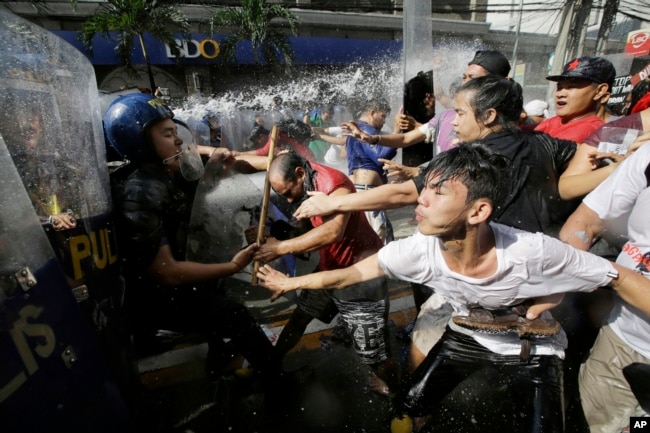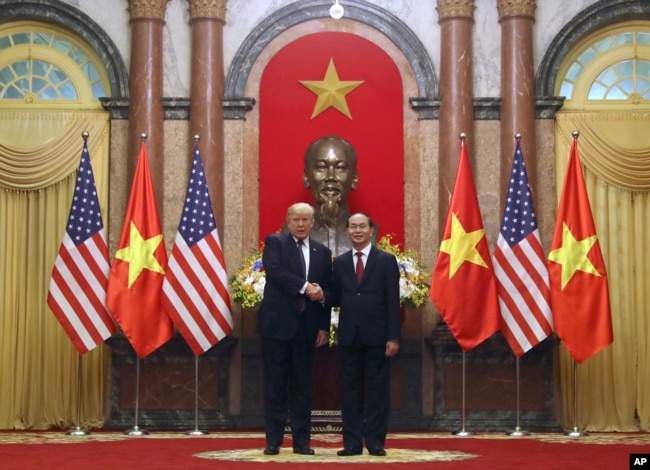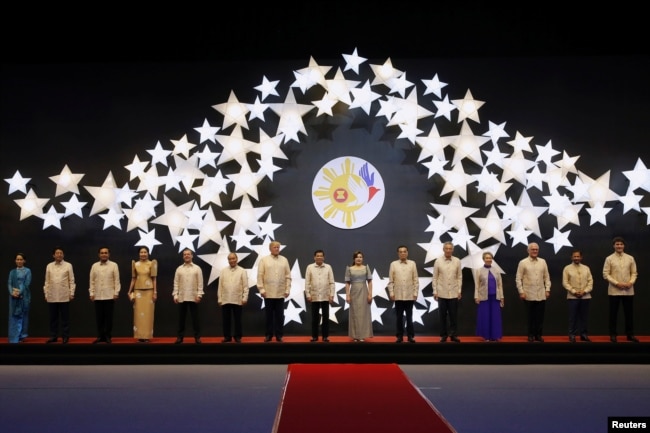
MANILA — As regional leaders gathered at a colorful ceremony to open this year’s ASEAN summit in Manila, Philippine President Rodrigo Duterte sidestepped the sensitive issue of combating illegal drugs, which he himself had raised.
In opening remarks at the plenary session of the 31st summit of the Association of Southeast Asian leaders Monday, he called illegal drugs a menace that threaten “the very fabric of our society,” without mentioning methods to control the crime.
“I apologize for setting the tone of my statement in such a manner, but I only want to emphasize that our meetings for the next two days present an excellent opportunity for us to engage in meaningful discussions on matters of regional and international importance,” Duterte told 17 other heads of state after also mentioning a recent fight against Muslim rebels in the southern Philippines as well as the broader threat of terrorism.
Duterte’s war on drugs
Asia experts say they do not expect President Donald Trump to raise human rights issues and concerns about extrajudicial killings when he meets Monday in Manila with Philippines President Rodrigo Duterte.
“I’m sure he will not take it up,” Duterte himself said Sunday. Human rights groups have expressed alarm over allegations that Philippines police have killed at least 3,000 suspected drug users and dealers in a countrywide crackdown — one of Duterte’s major campaign promises.
Trump told Duterte earlier this year that he is doing “a great job” but has yet to openly criticize the plain-speaking Philippines president for his alleged campaign of violence.
Except for comments on North Korea, the issue of human rights has scarcely emerged during Trump’s Asian tour.
Trump arrived in Manila Sunday. About 3,500 protesters tried to march on the U.S. Embassy and were stopped by riot police. The protesters shouted for Trump to leave and accused the U.S. government, a former Philippine colonizer of about 50 years, of looking for overseas wars.
One banner read “Dump Trump — #1 Terrorist!”
Duterte had once insulted former president Barack Obama, calling him a “son of a whore.” He also boasted of murdering someone when he was 16 years-old because the victim gave him a funny look.
Except for comments on North Korea, the issue of human rights has scarcely emerged during Trump’s Asian tour.
Trump arrived in Manila Sunday. About 3,500 protesters tried to march on the U.S. Embassy and were stopped by riot police. The protesters shouted for Trump to leave and accused the U.S. government, a former Philippine colonizer of about 50 years, of looking for overseas wars.
One banner read “Dump Trump — #1 Terrorist!”
Momentum in Vietnam
Before arriving in Manila, Trump met in Hanoi with Vietnamese President Tran Dai Quang. Trump told a joint press conference, “For trade to work, all countries must play by the rules. I am encouraged that Vietnam has recently become the fastest growing export market to the United States.”
He added “I am confident that American energy, agriculture, financial services, aviation, digital commerce, and defense products are able to meet all of your many commercial needs.”
Speaking to Communist Party General Secretary Nguyen Phu Trong in Hanoi, Trump said “Think where we are and where we have come, it’s a tribute to both countries. Trade has become a very important element of our relationship.”
Quang called his meeting with Trump as “A milestone in Vietnam-U.S. relations, creating strong momentum for the substantive, effective, and stable development of the bilateral, comprehensive partnership.”
The U.S. president said that in the past when his country “lowered market barriers, other countries didn’t open their markets to us….We expect that markets will be open to an equal degree on both sides and that private investment, not government planners, will direct investment.”
President Xi, whose country’s rise has been driven by large-scale government-planning, immediately followed Trump on the stage in Danang.
Xi embraced the multilateral concept, in particular calling for support for a Free Trade Area of the Asia-Pacific (FTAAP), which would harmonize regional and bilateral economic pacts.
China was left out of the TPP, which had been led by the United States and Japan, and was meant in part as a bulwark against China’s strategic ambitions. | via VOANews



